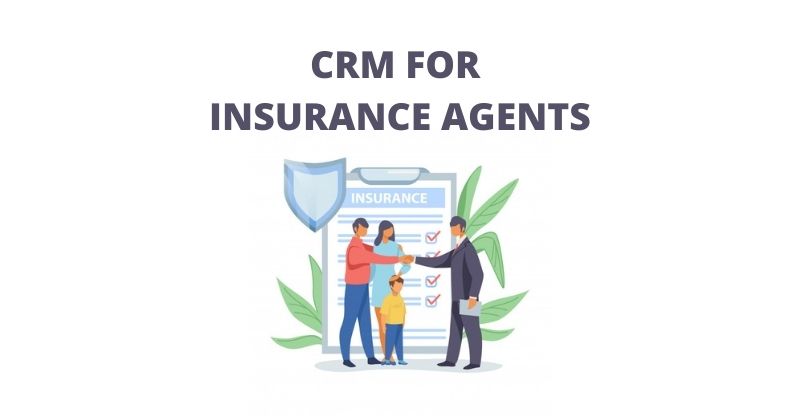As an Insurer, you must be familiar with CRM (Customer Relationship Management) software. You might have used CRM systems to store information about your customers (and leads) to help you interact with the customers via emails and calls more effectively. But have you thought of using a CRM to help your agents?
The problem with traditional software or LMS (Lead Management Systems) is that they work in a particular way. You might have to work with the legacy systems, and there is nothing you can do about it. Even worse, you have to enter every piece of the information yourself. The harsh reality is – you cannot customize them, and you might need to change your business process to use them.
In this article, we bring to you a CRM solution that keeps insurance agents in focus. Instead of changing your business processes, you can customize the CRM software for the greater good. It will make sales easy for agents and, at the same time, it will improve your overall process efficiency.
The first generation of CRM software focused on giving executives the best chance of closing a deal with their contacts. Pertinent information was saved and displayed when needed. For example, customer John Smith calls, and the exec quickly pulls up the record for Mr. Smith. He sees that Mr. Smith was previously interested in buying a car and couldn’t decide between a Ford or a Chevrolet.
The exec starts the conversation with a greeting and follows up by asking if Mr. Smith had chosen a Ford or Chevrolet. It doesn’t matter what his answer is, as Mr. Smith now knows that the exec is interested in him and has remembered their last conversation – even if the context was the furthest thing from the execs mind as the call came in.
Unfortunately, this same system won’t work for insurance agents.
Typically, insurance agents used to find leads on their own through their networks. Based on the policies sold, they would get commissions. But today, agents also work on the leads assigned by Insurers. After all, Insurers have a broader reach on prospects through digital marketing strategies.
Thus, you will need to think about the CRM that can streamline one of the most prominent policy distribution channels – agents.
Introduction to Insurance CRM
Insurance CRM (Customer Relationship Management) software is a powerful tool designed to help insurance agents, brokers, and agencies manage their customer relationships, streamline their sales process, and improve customer satisfaction. By leveraging the capabilities of insurance CRM software, insurance professionals can automate tasks, track customer interactions, and gain valuable insights into customer behavior. This enables them to provide exceptional customer service, increase sales, and stay ahead of the competition in the insurance industry.
With the right insurance CRM, agents can efficiently manage their leads, policies, and customer data, all in one centralized system. This not only saves time but also reduces the risk of errors and ensures that every customer interaction is recorded and accessible. As a result, insurance agents can focus more on building strong customer relationships and less on administrative tasks, ultimately leading to higher customer satisfaction and loyalty.
Challenges Faced by Insurance Agents
Insurance agents face numerous challenges in their daily work, including managing multiple policies, tracking customer interactions, and staying on top of sales leads. Without the right tools, these tasks can be time-consuming and prone to errors, leading to decreased productivity and customer satisfaction. Additionally, insurance agents must also contend with the complexities of the insurance industry, including regulatory requirements, policy changes, and market fluctuations.
By implementing an insurance CRM system, agents can overcome these challenges and focus on what matters most – building strong relationships with their customers. An effective CRM system helps agents stay organized, ensures that no lead or customer interaction falls through the cracks, and provides valuable insights that can inform their sales strategies. This not only improves efficiency but also enhances the overall customer experience, leading to higher satisfaction and retention rates.
1.. Tracking the lead from the start
To give the right answers and get the call through to the right team, you’ll need to know a little bit about the lead. If they are a pre-existing customer, you are likely to know them already. However, wouldn’t it be great to have an almost psychic ability to gather information?
A centralized online CRM that can capture the information before you ever speak to the lead will benefit your insurance business tremendously. Online insurance aggregator sites can pass on information directly to your CRM, while you will also have the opportunity to gather details via your website, social media, and PPC advertising. A recent survey on consumer behavior depicts that 67% of users interact with businesses on social media. The time is ripe for Insurers to invest in CRM that can integrate social and other digital channels to give a holistic view of customers to agents. Integration with cloud telephony systems allows you to capture data from phone calls (including complete call recording), and even real-world interactions with on-the-ground campaigns and billboards can deliver valuable data.
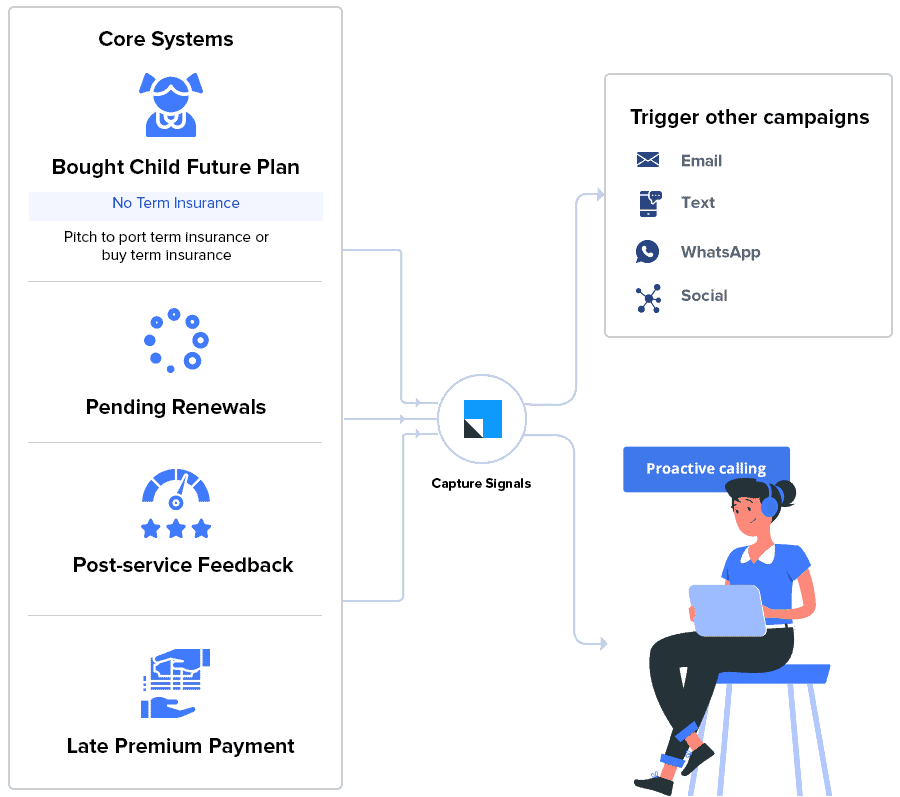
2. Sending the lead to the right agent
Now you have a little bit of background on your lead (all without having to lift a finger yourself), the system can automatically distribute incoming inquiries.
Have an insurance company with a field sales team or call center that specializes in health insurance and another that specializes in life insurance? No problem. The CRM system can route the call based on the type of insurance required, the location of the caller, the next available agent, or any other criteria you like. It is known as lead distribution.
Because it is all linked to a CRM, it will not matter as to who attends the call as all the relevant information is available at their fingertips.
Moreover, you need not change your business process. The system easily adapts to your needs in terms of the number of agents, the involvement of call-centers, etc.
3. Customizing the CRM for Your business
As time goes on, every lead will have more and more data added to their profile. Lead scoring allows you to set the importance for certain pieces of information. For example, if a lead has already bought a similar policy, then the response to the email or action on the email can be the best metrics to track. It is because, in this case, the lead is more likely to get in touch with the company via emails.
Here, the benefit of CRM is – you can customize it for your business. Investing in insurance CRM solutions can significantly enhance data organization and client interaction, providing tailored features that improve efficiency and foster better relationships with clients. Based on your business logic, you can set the lead-attributes that you wish to evaluate. The leads with the highest score are the ones that are most likely to make a purchase. You can confirm what they need by replaying the recordings of the calls they have had with you.
Every agent will have their custom page to tell them what they need to do for the day. Moreover, if the manager las already planned the action items, it would be merely a matter to send agents or salespeople alert (notifications) on their devices. Managers and team leaders can even configure sales automation for repetitive tasks. This way, the agents will always know what they need to do next.
4. CRM for field sales agents
Field sales team members can use mobile CRM while out on the road. You do not have to wait for them to return to the office to add or update the CRM. They can do it right there and then. Plus, the information is immediately available should the lead call in. To ensure that the customers receive a response in time, managers can check whether the agents arrived in the meetings in time.
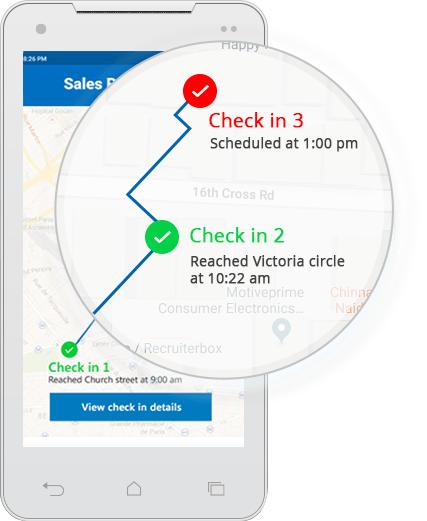
5. Automation to make agents’ life easy
Some of the insurance policies go hand in hand with others – giving a cross-sell opportunity. CRM can identify these opportunities and suggest agents to try to make the second sale. Additionally, with the automated renewal process, you will never miss on revenues from existing customers.
The system can automatically notify the policyholders that they need to renew. In case the customer does not take the initiative, the system can trigger a notification to the agents to follow up with the customer.
6. A CRM for the whole company
You can assign different access rights to the users. It will ensure that agents are up to their designated tasks and don’t go about exploring what others are doing. Another benefit of this scheme is that it keeps the information secure. To mention – it is also a necessary GDPR & HIPAA compliance that only authorized person should be able to access the information.
Whether you’re looking for CRM for life insurance agents, or for health and P&C agents, LeadSquared CRM can benefit the organization at large with analytical tools and reporting. You can create custom dashboards for users. For managers, performance tracking and leads reports, departments, geographic locations, policies sold rate, lead engagement, etc. can matter more. Thus, managers can have a different set of dashboards.
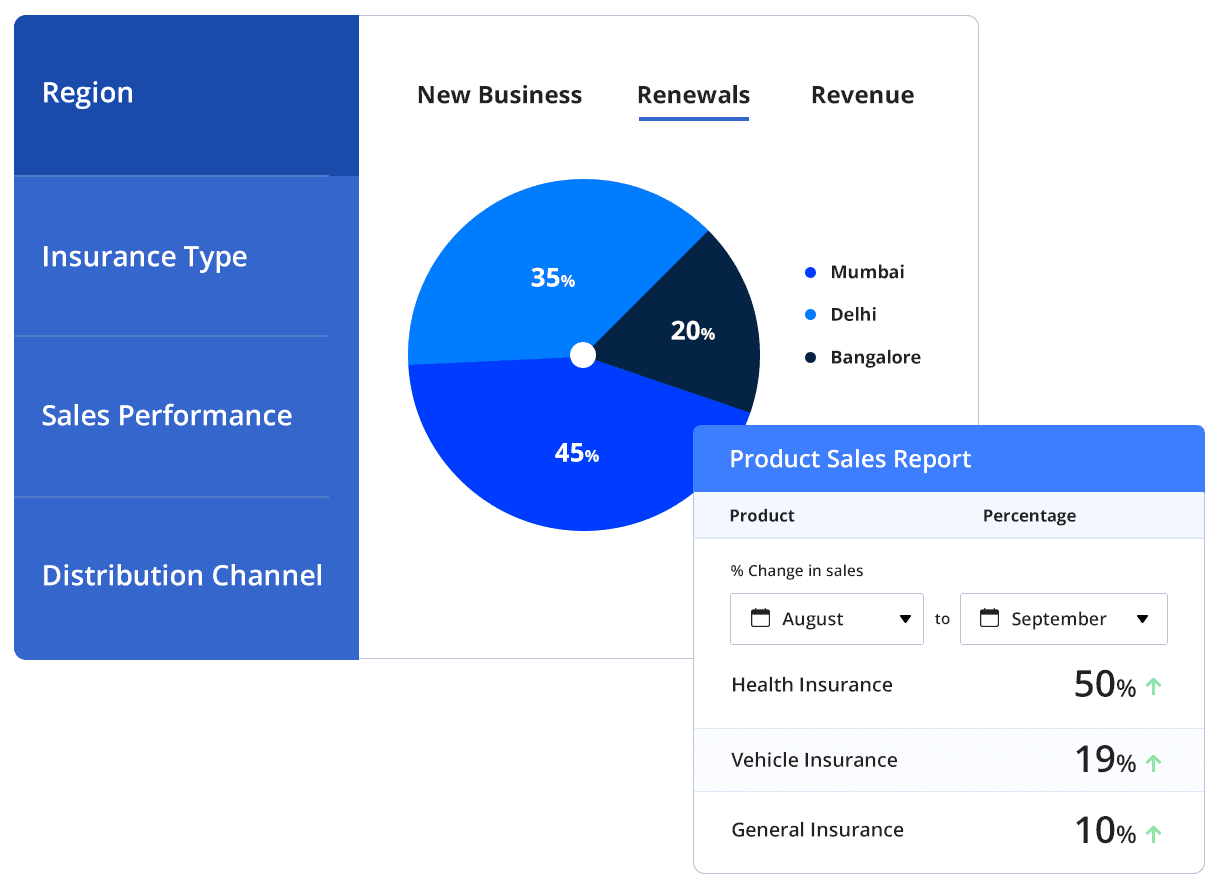
In the instances where an agent decides to discontinue working with your organization, you’ll not lose the details about your customers. The CRM system will keep customer information secure for future use.
9. Choosing the Right Insurance CRM
Choosing the right insurance CRM software is a critical decision for insurance agencies and agents. With so many options available, it can be overwhelming to determine which system is best suited to your needs. When selecting an insurance CRM, consider the following factors:
Ease of use
Is the system user-friendly and easy to navigate? A CRM that is intuitive will ensure that your team can quickly adapt and start using it effectively.
Customization
Can the system be tailored to meet the specific needs of your agency? Customizable features allow you to align the CRM with your unique business processes.
Integration
Does the system integrate with other tools and software you use? Seamless integration with existing systems ensures a smooth workflow and data consistency.
Customer support
What kind of support does the vendor offer, and how responsive are they to your needs? Reliable customer support is crucial for resolving any issues that may arise.
Scalability
Will the system grow with your agency, or will it become outdated quickly? A scalable CRM will accommodate your business growth and evolving needs.
By carefully evaluating these factors, you can choose an insurance CRM system that meets your needs and helps you achieve your goals. The right CRM will not only enhance your current operations but also support your long-term success.
10. Best Practices for Insurance Agents Using CRM
To get the most out of your insurance CRM system, follow these best practices:
Use the system consistently
Make sure all agents and staff are using the system regularly and consistently. This ensures that all data is up-to-date and that the CRM is being utilized to its full potential.
Keep customer data up-to-date
Ensure that customer information is accurate and up-to-date to provide the best possible service. Regularly updating records helps in maintaining a clear and current view of each customer.
Track interactions
Use the system to track all customer interactions, including phone calls, emails, and meetings. This comprehensive record helps in understanding customer needs and preferences.
Analyze data
Use the system’s analytics capabilities to gain insights into customer behavior and identify trends. Analyzing data can reveal opportunities for improvement and growth.
Customize the system
Tailor the system to meet the specific needs of your agency and customers. Customization ensures that the CRM aligns with your business processes and goals.
Provide training
Ensure that all agents and staff receive adequate training on the system to get the most out of its features and capabilities. Well-trained users can leverage the CRM more effectively, leading to better outcomes.
By following these best practices, you can maximize the benefits of your insurance CRM system and achieve greater success in the insurance industry. A well-implemented CRM not only enhances efficiency but also fosters stronger customer relationships and drives business growth.
The CRM Insurance Agents Can Trust
Automation not only eases the workload of insurance agents but also gives you time to concentrate on the tasks that need immediate attention. Once you have identified the promising leads and their persona, you can devise the appropriate communication strategy for agents. This way, for agents, selling policies will become much simple.
The modern-day insurance CRMs are also equipped with resources to upgrade the agents’ knowledge. From product information to training videos – agents can easily access the required information/resources from the portal. CRM tools can thus become an always go-to option for agents.
The Bottom Line
As the insurance industry is evolving, so is the need to ramp up the business processes. Insurance agency CRM software offers specialized features that cater to the unique needs of insurance professionals, enhancing business processes through automation and improving internal workflow. A few years ago, agents and brokers were the only touchpoints for customer interactions. But, today, as online selling is becoming more popular, Insurers need to equip their agents with tools and technology to make customer interaction more humane. The role of agents is not off the market. Customers still prefer talking to an agent or meeting an agent in-person for information, advice, purchase, and claims. The following exhibit from McKinsey illustrates that the agents and call-centers/service centers are the most approachable access points for customers.
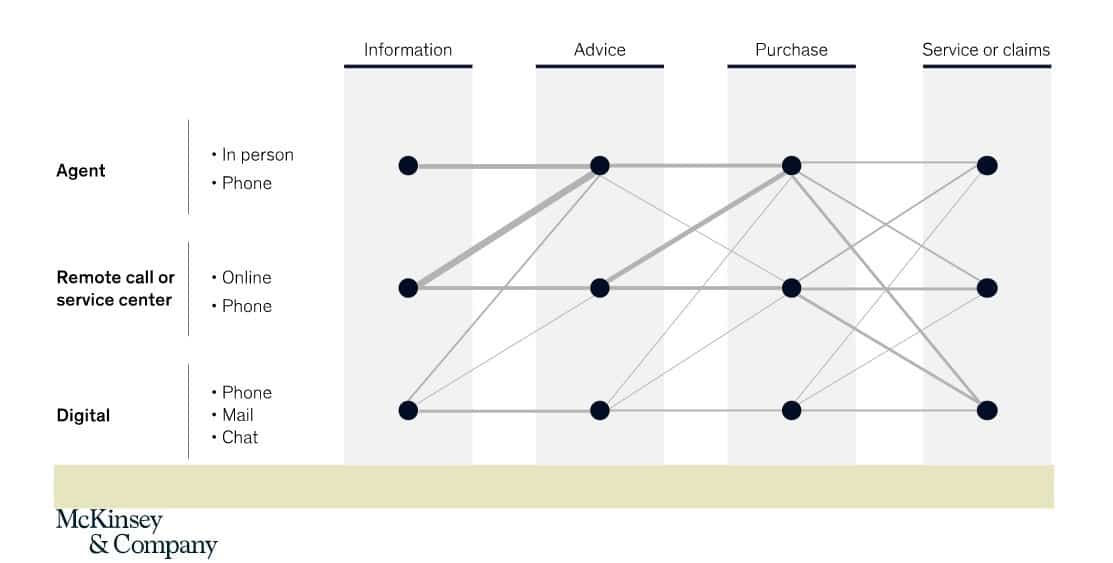
Thus, the key to successful digital transformation in insurance is to upskill people and help them leverage technology. The modern-day CRMs are so intuitive that an agent with basic knowledge of using apps and computers can become proficient with basic training. To improve your process efficiency, Insurance CRMs built with agents in focus can be your go-to option.
F
Further Reading:
- 3 Insurance selling tips you can implement right away
- The best CRM for life insurance agents
- CRM software for insurance agencies
Insurance CRM FAQs
The best CRM for insurance agents is undoubtedly LeadSquared. It comes with a mobile CRM app that agents can carry with them on the field. It helps insurance agents to find a customer’s location, add meeting notes, upload documents, and more.
CRM in insurance is essential to ensure effective communication between agents and customers. CRM software can help you devise strategies and incorporate methods and tools to deliver better customer experiences.
CRM corresponds to Customer Relationship Management software. It helps you manage all your company’s relationships and interactions with your prospects and customers. CRM is a great application (tool) for sales management, contact management, workflow processes, and improving employee and agent productivity.





